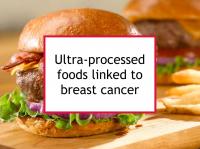Relatively high consumption of ultra-processed foods has been linked to various cancers, including breast cancer, in a number of studies. Now a new meta-analysis of data from previous studies has reported that high intake of fast foods and ultra-processed foods is associated with increased breast cancer risk, with high intake linked to as much as 25% greater risk.
Fast and ultra-processed foods and breast cancer
Fast food is quickly prepared food that is sold in fast food or take-out restaurants. Ultra-processed foods are prepared, at least in part, using industrial machinery, and normally incorporate multiple chemical ingredients. They may not contain many, or even any, whole or minimally-processed ingredients. Major categories are (1) breads, cakes, cookies and desserts; (2) carbonated beverages; (3) fruit juices made using industrial fruit juice production methods; (4) breakfast cereals; (5) bacon, sausages and other processed meats; (6) dairy products and derivatives; (7) packaged savory snacks such as potato chips; and (8) sweets and candy.
The addition of sugar, salt, and other additives and preservatives, in combination with the near absence of fiber and beneficial phytonutrients in such foods, have been proposed as partial explanations for their cancer-promoting properties.
There are other specific links between such foods and breast-cancer, among them
- Exposure to repeatedly reheated restaurant frying oil used over a period of days. This pattern of use causes "thermal abuse" of frying oil, resulting in chemical changes that appear to promote breast cancer
- Exposure to bisphenol A (BPA) and phthalates in food containers and packaging. Both have endocrine-disrupting properties linked to breast cancer risk
- Increased likelihood of a high overall omega-6 to omega-3 dietary fatty acid ratio, a breast cancer risk factor. Processed food companies and restaurant chains are moving away from using partially-hydrogenated oils, which is a beneficial change. However, they typically substitute omega-6 oils.
Latest research finds link to breast cancer
The meta-analysis referenced above was designed to investigate the associations between fast food and ultra-processed food intake and breast cancer risk in females from a variety of worldwide geographical locations. To conduct the study, the authors performed an extensive search of online databases; a total of 17 observational studies were selected for inclusion and relevant study data from 2014 through 2024 was extracted. Various analyses were performed to ensure robustness.
Women in the highest levels of fast food and ultra-processed food consumption were found to have a 25% higher risk of breast cancer risk than those in the lowest consumption levels. Subgroup analyses demonstrated that the positive association between such food consumption and breast cancer risk held in case-control studies and held regardless of whether sample size was less than or greater than 1,000, but not in cohort studies or when divided by menopausal status.
The authors conclude that the findings suggest that diets high in ultra-processed foods may contribute to breast cancer development. Public health policies targeting food processing, marketing, and labeling, as well as healthy food accessibility, are important for cancer risk reduction and prevention, according to the authors.
